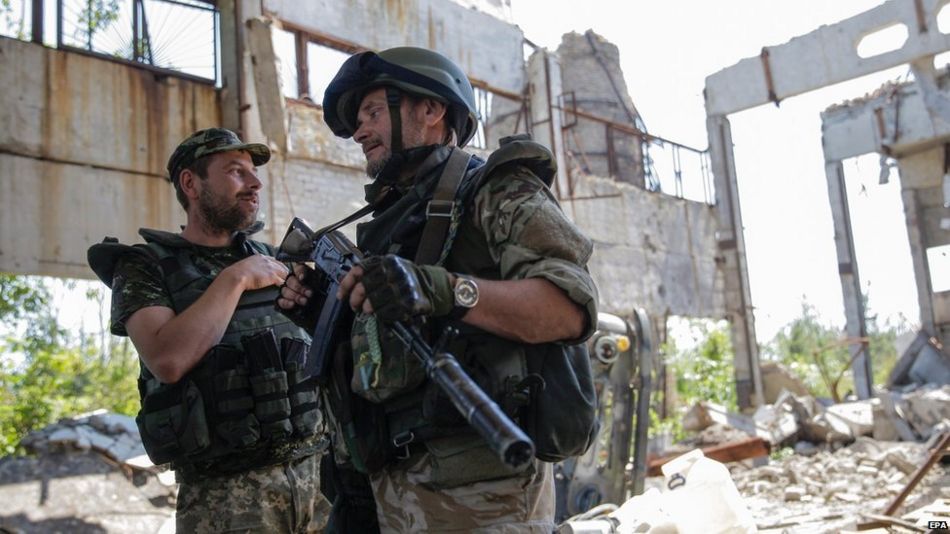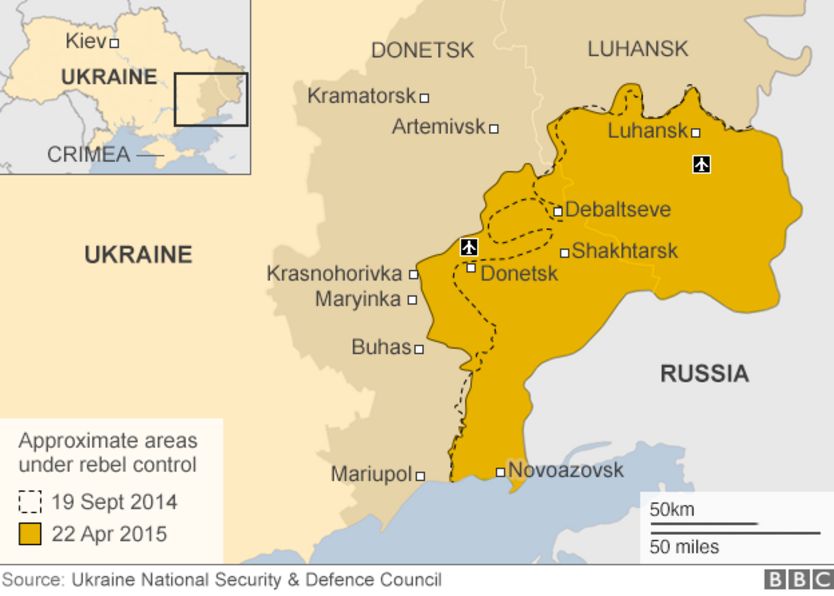- From the section Europe

Fighting
in eastern Ukraine has fallen to its lowest level since the conflict
started, Ukrainian Defence Minister Stepan Poltorak has said.
Mr
Poltorak said Ukrainian forces were coming under attack just two to four
times a day - the lowest rate in the past year and a half.The reduction in violence comes a week after the latest ceasefire agreement came into force on 1 September.
Last week's truce aimed to reinforce an agreement struck in Minsk in February.
However, the UN said that civilian casualties more than doubled in the three months to mid-August, largely due to shelling by heavy weapons.
Positive noises - by David Stern, BBC News, Kiev
For the first time since the beginning of Ukraine's conflict with Russian-backed militants, there is tangible hope.A ceasefire was introduced last week and seems to be holding. Whether this spells the end of the conflict altogether remains to be seen. But, without a doubt, there is movement both on the ground in the east and in official circles.
Significantly, the rebels themselves are making positive noises.
And some observers are interpreting a sudden change of leadership in the self-declared Donetsk People's Republic, which took place over the weekend, as a possible sign that Moscow wants to end the violence.
But the fighting could flare at any moment, as President Petro Poroshenko reminded government officials on Tuesday. And any final peace deal will potentially face resistance from some quarters in Kiev, eastern Ukraine and Moscow.
Has conflict fuelled influence of far right in Ukraine?
Almost 8,000 people had been killed and nearly 18,000 injured since the conflict began in April 2014, the UN added, although it warned the true number could be much higher.
In a separate development on Tuesday, Ukraine's government accepted the jurisdiction of the International Criminal Court (ICC) over any war crimes that may have been committed on its territory since February 2014.
Last year, Ukraine accepted the court's jurisdiction only for the period between November 2013 and February 2014, in which pro-Russian president Viktor Yanukovych was ousted.
Mr Poltorak told journalists: "We come under two to four attacks a day, this is the lowest number of shootings over the past year-and-a-half."
Kremlin spokesman Dmitry Peskov acknowledged fighting had died down but blamed Kiev for not moving forward on other provisions of the agreement, including greater autonomy for the rebel-held eastern regions of Donetsk and Luhansk.
"But if you look at other conceptual points of the Minsk agreements ... unfortunately you cannot note progress, it is impossible."
The Minsk Group, run by the Organisation for Security and Cooperation in Europe (OSCE), met on Tuesday to discuss the latest developments.

Three members of Ukraine's national guard were killed when nationalists protested against the deal.
Fighting escalated over the summer between the rebels and Ukrainian army forces, but the two sides agreed in late August to halt the violence on 1 September, the day children in the region return to school.
Separatists seized large swathes of Donetsk and Luhansk in mid-April 2014, a month after Russia annexed Ukraine's southern Crimea peninsula amid international condemnation of the move.
Moscow denies accusations by Ukraine and the West that it arms the rebels and sends regular troops across the border. The Kremlin says Russian "volunteers" are fighting alongside the rebel force in Ukraine.
No comments:
Post a Comment